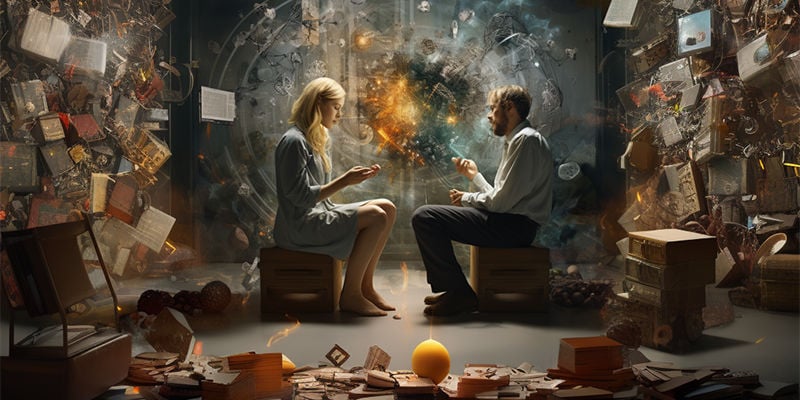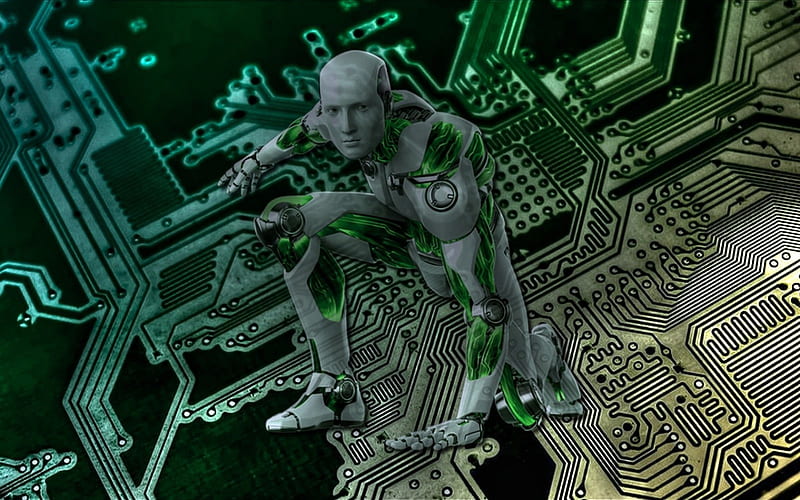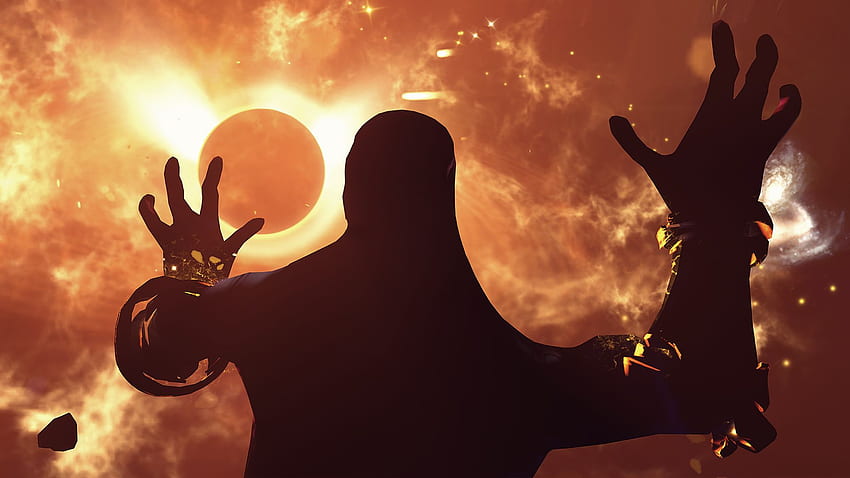When we are playing ‘the game’ we are rewarded for removing ourselves from reality. This is essentially how the game works – the more unreal we become, the greater the reward, the greater the accolade. The state of being ultimately removed from reality, the state of being ultimately unreal, is therefore ‘the best possible outcome’. When we’re playing the game this is the Jackpot, the Big Pay-Off – it is the state of being The Winner.
Being the winner of the game means that we have removed ourselves from any possibility of perceiving ourselves as being anything other than what we ourselves have said we are. We have removed ourselves from any possibility of being redefined. We have in other words become absolutely invulnerable – we have achieved our goals and this achievement cannot ever be taken away from us. As James Carse says, we have achieved the status of Master Manoeuverer and no one can outmanoeuvre us. All the boxes have been ticked and no one can ever un-tick them; we have been awarded the certificate of achievement and that is that…
In the game the goals are however never any more than ‘a means to an end’. No matter how much fuss we might make over them, they aren’t the thing that counts. What counts is becoming invulnerable. Or as we could also say, the ‘end’ that the goals are a means to is that our status as ‘the one who has successfully obtained the goals’ has been established once and for all. All the emphasis is on the goals and attaining them, all the emphasis is on how great it would be to attain the goals, on how great our glory will be, but what really matters (under all the pomp and pageantry) is not how great it is to achieve the goals but how great it is to be the attainer of the goals. It’s not the thing we care about, but the one who is ‘doing the thing’.
Because the attaining of the goals is such a great thing the one who attains them must be great too. We’re not just playing the game in order to be the glorious attainer of the goals however – that’s just the icing on the cake. That might be said to be the ‘overt or explicit level of meaning’ of the game we’re playing. Really, we’re playing in order to feel that we exist. We’re playing to validate ourselves, ontologically speaking. Because the attaining of the goals is a real thing then so too – by direct inference – must the one who attains them be real. By playing the game (and forgetting that it is a game) we gain the illusion that the player of the game exists, and this is what we – as game players – are really playing for. This is the covert or implicit level of meaning in the game – by getting 100% caught up in playing the game the assumed implication is that ‘the game player is real’. We’re so busy trying to win that we lose sight of the fact that the game isn’t real; more than this however, we lose sight of the fact that the player of the game isn’t real either.
When all the attention is on the attaining of the goals and how great they are then there is no attention on the shoddiness of the game player. When all the attention is on how great it is to be a winner then there is no attention at all on the inherent non-existence or unreality of the so-called winner! Being a winner is a wholly ‘extrinsic’ sort of a thing – it is an externality, an appearance and nothing more. It exists ‘all on the outside’ and when we buy into the whole ‘winners and losers’ thing all of our attention has to be all on the outside too. Being a winner – as we would know very well if we bothered to reflect on it – is only a theatrical performance, just as being a loser is. Having an identity that is defined in terms of either attainments or failures is a theatrical performance – it doesn’t have anything at all to do with who we really are and yet when we are playing the game this is all we care about.
The basic premise in the game is that the more goals we attain the more this adds to our status. We are our successes, in other words. If we don’t have any successes, any achievements, then we don’t have any status at all. We have a dud status, a dummy status, a derisory status! Not succeeding is the same thing as losing after all and so to have no achievements under our belt is to have a negative existence – a type of existence that is tarnished, a type of existence that is inextricably linked with a painful sense of unworthiness. Instead of having pride in our identity, we have shame. Our very being – it seems – is marked by shame. When we feel ourselves to ‘be a loser rather than a winner’ this is in no way felt as being just some external sort of a thing – it is felt to be something that belongs to our ‘core essence’, so to speak. I very much feel that ‘I am a loser’…
All of this is of course very well understood by us all! We all know this perfectly well, we just don’t happen to think anything of it. That’s the harsh reality and we just have to get used to it. It seems ‘normal’ to us. We all know how to play the game – we all know what the rules we are playing by are. The rules are that you are either going to come out as a winner or a loser and that being a winner is a good thing just as being a loser is a bad thing. What is not at all clear to us however is that [1] the player of the game is defined by the game and that [2] the game is only a made-up thing anyway. In other words, what is not at all clear to us (what is totally unclear to us) is that being a winner or being a loser isn’t a real thing in the first place! The game isn’t real – it’s only something that we pretend is real. It is therefore impossible to be a loser, just as it is impossible to be a winner. This then makes it a very curious thing indeed that we get to feel so good about the former and bad about the latter. Both the glory and the shame come out of an illusion; both the satisfaction of gain and the dismay of loss come out of an illusion…
It’s not just that this is ‘unclear’ to us – what we are talking about here is actually the very hardest thing to understand. Quantum mechanics is easy in comparison. We can understand games alright but what we understand as a game is something that we can play or not play as the whim takes us. We understand it to be the case that we can play a game if we want to, or not play it if we don’t want to. We understand it to be the case that we can walk away from a game if we don’t feel like playing it. Or to put this another way, I believe that I – as the person I understand myself to be – have an existence that is independent of the game that I am playing. But we’re not talking about regular old games like table-tennis or blackjack or monopoly here – we’re talking about The Game. We’re talking about ‘the Game of Tautological Self-Creation’, which is the game where we get to believe that we are somebody (some conditioned entity) who doesn’t actually exist!
The Game of Tautological Self-Creation is the game we all play without knowing that we are playing it. We’re playing it but we’re (implicitly) saying that we’re not playing it. “I’m not doing anything!” I say, with my hands held innocently up in the air. But the truth of the matter is that we actually are doing something and if we were to somehow stop doing it then this would cause a very profound change; this would bring about the most profound change of all – the change from illusion to truth, the change from ‘unreality which pretends to be real’ to ‘reality which doesn’t need to pretend anything because it is real already’. There absolutely couldn’t be any greater change than the change from the unreal to the real and yet at the same time this can never be more than a strictly subjective sort of a change since the change in question never actually took place at all. It never actually took place because ‘the unreal’ never existed in the first place…
We could also say that the transition from the unreal (which is as we have said only subjectively true) to the real is the biggest shock that there is, the bigger shock there ever could be. There can be no ‘shock to the system’ that is greater than this! The bigger the change the bigger the shock and changes just don’t come any bigger than this, as we keep on emphasizing. This change is absolutely unprecedented – it comes at us from a direction we never even knew existed! We never see it coming – it’s something we never could have expected. The shock that comes about as a result of this switch-around can be joyous or it can be terrifying, depending on our orientation. If I am favourably disposed to discovering that the world is radically different to what I had previously assumed it to be (or that I am not at all who I had thought that I was) then the shock is a joyous one, but if on the other hand I happened to be unfavourably disposed to making this discovery then the shock that we are talking about here is the very last thing that I would ever want to be subjected to!
All of this is another way of saying that when we are unfavourably disposed to discovering that the world is radically different to what we had assumed it to be (or that we aren’t at all who we thought ourselves to be) then reality is actually our enemy. Hence the game that we are playing! We are playing a kind of a ‘back-to-front’ (i.e. perverse) game in which the positive direction to be moving in is the direction away from reality. Reality is not seen as ‘reality’ therefore but as some sort of ‘negative value’. We don’t know reality to be reality but what we do ‘know’ is that movement in this direction equals ‘a bad thing’, equals ‘a disaster’, equals ‘losing’, etc. Movement in the other direction, on the other hand, equals ‘a very good thing’, equals ‘winning’, equals ‘success’, etc.
If we can understand this business (this backwards or perverse game) of ‘assigning a negative value to reality’ then – at one and the same time – we can understand fear. Fear – at its root – is a manifestation of the perverse relationship that we, as conditioned entities, have with reality. As rational beings we say that fear is nothing more than a physiological mechanism but fear goes far deeper than this. Fear doesn’t have its origin in changes in our body chemistry, in our adrenaline and cortisol levels and so on, (although it may involve such changes) – it has to do with our desperate clinging on to illusions! If we wanted to be perfectly straightforward about this, what we would say is that our desperate clinging on to illusions doesn’t just ‘cause’ fear, but rather that it is fear.
The state of being in which we are desperately hanging on to an illusion is the state in which we are maximally averse to seeing that the illusion in question is an illusion. Our intense attraction to believing that the illusion is not an illusion (i.e. our intense aversion to seeing that the illusion only is an illusion) is of course the very same thing as our ‘aversion to reality’ and an ‘aversion to reality’ is just another way of talking about fear.
Of course we’re averse to reality – we’re 100% committed to believing that we are a wholly unreal entity (a purely virtual entity) and all of our well-being is tied up this virtual entity not being an virtual entity. This – needless to say – is not a very good horse to put our money on. This is not exactly a great situation that we have set up for ourselves here! Our well-being is tied to the ‘health’ of an unreal or virtual entity such that when it seems that this virtual entity is doing well we feel good and when it seems to be not doing well we feel bad. Actually however the virtual entity which is the I-concept or self image is never going to be doing well – it is not doing well and it never will be doing well for the simple reason that it doesn’t exist! Its ‘health’ is a purely virtual commodity – an unreal commodity.
By the virtual self’s own standards ‘not existing’ is the ultimate failure, the ultimate disaster. For the virtual self therefore, we can say that reality equals ‘the ultimate fail’. Or as Chogyam Trungpa puts it, “Enlightenment is ego’s ultimate disappointment”…






